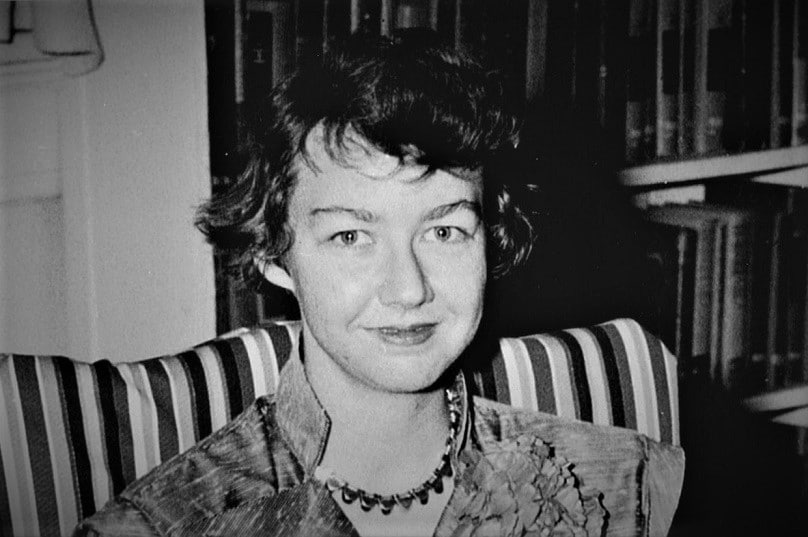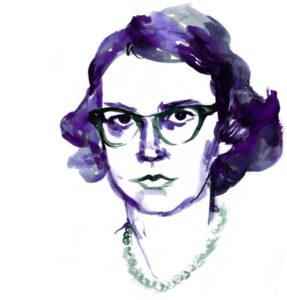
One winter school morning a long time ago, I approached my group of friends shortly before the bell rang for the start of the day. One of them stared at me in shock.
What?
Have you looked in the mirror this morning?
Yeah. What?
Did you do your hair?
Yes! Of course!
You can’t have! Your fringe looks ridiculous. Seriously. It’s really bad.
I said it was fine, and who cared anyway? She then pulled me, protesting, into the toilets where there was a mirror so she could prove to me how awful I looked.
It was pretty bad. In the space between home and school, in spite of my attempts to tame its waviness, a combination of being too short in the front and the damp air had caused it to curl into two big cowlicks.
It looked like a large cartoon moustache was perched on top of my large, shining forehead.
I was mortified. Turning up to school looking strange, and not in a cool way, is one of the worst social sins a teenage girl can commit.
My friend turned on a tap and by combing water through it with her fingers, did her efficient best to settle the structure down a bit. Painfully self-conscious as I was back then, I felt too humiliated to be grateful.
It was a tiny incident and funny to remember now, but I also remember the terror at being singled out, the indignity of being forced to face my own reflection when I didn’t want to see it, and the shame I felt.
The other week I got a present from my husband. It was The Abbess of Andalusia: The spiritual journey of Flannery O’Connor by Lorraine V Murray.
It looks at the spirituality of this much-loved and lauded American Catholic writer, through the letters she wrote to her friends and people she mentored, many of them other writers plus a number of priests and religious.
I enjoyed it very much. O’Connor seems to have been a very good person. Her commitment to her faith, her writing, and her friends inspired me.
There was a moment while reading bits from letters that went back and forth between her and a friend who wanted to join, then subsequently left, the Church, that a thought suddenly rose within me: “I’m a deeply selfish person. I’m going to have to do something about it.”
It came to me as a simple and serious fact. I didn’t feel guilty, or defensive, or ashamed. Just grateful that somehow, while reading about someone else’s great generosity of spirit towards others, that I recognised the opposite in myself. I hadn’t been thinking about myself at all, but I had suddenly found myself before a mirror.

How different it is to be shown one’s fault in this way – a much more serious fault than allowing myself to get a bad hair cut – without harsh judgement, or fear of a horrible consequence. Simply a truth, revealed at a moment when I was ready to receive it, and in a way that also gently showed me how to begin remedying the fault.
I have never understood the kind of thinking that leads someone to tell another person the ‘truth’ about something they’re doing wrong, for their ‘own good’. In the few times I’ve been on the receiving end of that it’s only made me defensive and distrust that person in future.
I can understand throwing someone’s faults at them in an argument, or in a moment of shock (like my friend on my bad hair day), but in cold blood, out of so-called charity towards the sinner, or a self-imposed duty to ‘tell it like it is’, no.
We never help a person by pointing out their flaws. Jesus told us this explicitly with the business about removing the log in one’s eye before trying to remove the speck in that of one’s brother.
Still, we do need to know ourselves and how we can try to be better. I think there is something about the distance or perspective that a piece of art or literature can gives us, or the space that we somehow occupy when we are deeply immersed in a book, or piece of music, or a performance, that sometimes allows us to get a glimpse of ourselves and our true situation.
It’s one way that Lectio Divina, praying with the scriptures or other spiritual reading, works so well.
It’s the way Jesus worked with Zacchaeus and the Samaritan woman at the well. He didn’t point out their sins, but during their time with him who is pure goodness they were brought to a point where they clearly saw themselves with their faults and failings, and they became good themselves.
Jesus was something like a mirror in which they saw themselves more clearly, along with the way they could be more like him.
I’ve always loved reading and following the lives and writings of holy people. And I love stories, real and fictitious, which show great virtue. In encountering human goodness, wherever I find it, I am always moved to admire it and sometimes inspired to be more like the good that I’ve witnessed.
In all of my reading, whether for work or for pleasure, I hope to find inspiration for living and to gain knowledge. But on a deeper level I realise that in my search for examples of goodness I have been trying to find God, and to see myself as I am before God’s gaze.
I’m also mindful that as a parent, I’m a walking and talking mirror for my children. When they look at me today, what image of themselves do I cast back to them?
Is it one of grace and truth, like the one I receive from reading and prayer and people who love me; like Zacchaeus saw himself before Jesus? Or is it a harshly judging or shaming one, as the world often throws back at us?
I’m sure that the more I allow myself to stand before Jesus, in whose image and likeness I’ve been made, the more my children will gain from seeing themselves reflected in the way that I look at them.
I want them to feel safe to look at themselves in the mirror I’m able to be for them, not ashamed, even and especially if there is something they need to change.
And for the non-metaphorical mirrors, I now own a very good hair straightener which my daughters are welcome to borrow.
